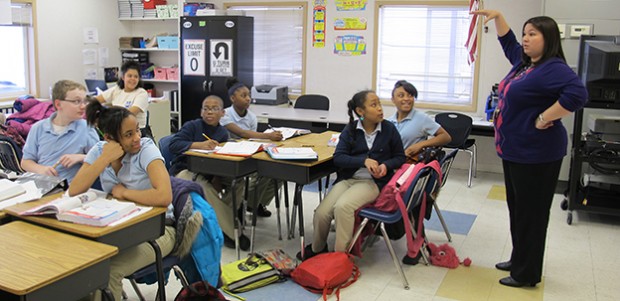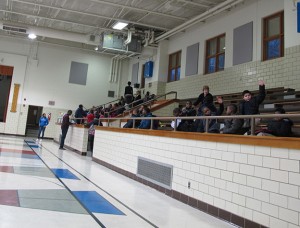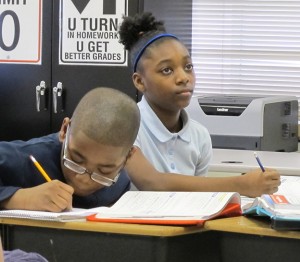Should An Underperforming Charter Be Closed Even If It's 'The Best School In The Neighborhood'?

Kyle Stokes / StateImpact Indiana
A math teacher leads a lesson on mathematic inequalities at Charter School of the Dunes in Gary.
It’s not enough, Russ Simnick says, for a charter school to be simply better than other schools nearby.
If charter schools don’t succeed on their own terms — conditions for academic performance their leaders spell out in the school’s founding documents — their authorizers must revoke their charters, Simnick says.
“Unfortunately, sometimes that means you shut down the best school in the neighborhood,” says Simnick, the president of the Indiana Public Charter Schools Association. “It still might be an underperforming school that needs to be shut down, but it might be the best option in the neighborhood at that time.”
—Rev. Michael Nickelson, Timothy L. Johnson Academy
It’s not clear whether the seven schools whose charters Ball State University revoked last month are, in fact, the best schools in their neighborhoods. All seven schools’ passing rates on statewide tests are lower than the traditional public school districts surrounding them.
But supporters of the schools facing closure say the numbers also show students making significant academic gains, and some parents are struggling to reconcile data showing their schools underperforming with evidence their children are succeeding.
- Would 'The Children Be Lost' If We Shut Down These Charter Schools?StateImpact Indiana‘s Kyle Stokes talks to parents about what they fear losing if seven Ball State-authorized charter schools end up closing.Download
Quality, From The Parent’s Perspective
Lanonya Jackson’s daughter wasn’t unhappy in the Gary Community Schools. But she was sick of bringing home D’s and F’s on her report cards.
Something had to give. So at the insistance of her husband, Jackson says she pulled her daughter out of the district school and enrolled her in Charter School of the Dunes.After the switch, her daughter started bringing home A’s, B’s and maybe a C or two. Jackson thinks she knows why — her daughter loves the charter school’s teachers, which is a huge contrast from what she saw in the district’s staff.
“Some of the teachers really just didn’t care about their job anymore. They really lost hope,” Jackson says. “And so we arrive here, the teachers have so much love and so much hope and so much confidence that no matter who your child is, they can succeed.”
Where Jackson sees success, Ball State officials see academic underperformance.
Judging from their passing rates on the ISTEP+, Charter School of the Dunes parents would do better enrolling their kids at the school around the corner — a school in the Gary Community School Corporation.
Bob Marra, head of Ball State’s Office of Charter Schools, says he’d prefer to see the schools succeed. But he says the data don’t show enough signs that the seven schools are making progress.
“While I understand it may cause some short-term difficulty for families, it is a decision made in the long-term best interests of their students,” he said in a statement last month.
What About Safety?
But Jackson says she’s worried about violence in the traditional school district — and she isn’t the only parent concerned.
“I’m not just thinking about [my daughter’s] scores in school, but I’m thinking about her safety,” says Daniel McKinney, another Charter School of the Dunes parent.
“The smart kids, the kids that want to learn,” McKinney adds, “they’re here [at the charter school] and they don’t have that fear factor.”
But Simnick says “it’s not good enough just to provide a safe school” — or unique programming or curriculum for that matter — if students’ test scores don’t meet goals spelled out in the school’s charter.
Closing these schools down can be tough in the short term, Simnick says.
But it’s better for students in the long term, Greg Richmond of the National Association of Charter School Authorizers says, because it offers families the opportunity to find better schools. He told StateImpact:
You have to be at the bottom of the barrel to get closed. You’re not a middling school. You’re not an excellent school. You’re at the bottom. And the kinds of things you’re hearing these people say are that we should pay no attention to whether kids can read at grade level or not, because, ‘Well they like it here’… We’ve got to help kids prepare to succeed in life, be able to graduate, be able to go on get a good job, be able to go on and succeed in college, be successful. Not just be comfortable.
Students Who Fell Through The Cracks
But leaders at some of the schools slated for closure dispute Richmond’s contention.
As Charter School of the Dunes’ principal told us, most of the students who enrolled in the school this year came in well below grade level. (We have more data on the seven charter schools’ academic performance here.)

Kyle Stokes / StateImpact Indiana
Students at Timothy L. Johnson Academy in southeast Fort Wayne gather in the school's gymnasium at the start of each day. Here, they say the Pledge of Allegiance together along with a second creed in which they "accept the challenge to be the best that they can be."
At Timothy L. Johnson Academy, a Fort Wayne charter Ball State also slated for closure, school leaders say they serve a population of students who have difficulties in traditional settings — or even alternative schools.
With scarce resources in the school district, Johnson Academy board president Rev. Michael Nickelson says difficult students often fall through the cracks.
“The [school district] teacher has to make a decision, and that decision’s really clear,” Nickelson says. “‘Do I sacrifice the education of 20 so that I can educate two?’ And what happens generally is the two are generally removed from that setting, and the 20 are educated. For us, we take the two.”
Thirty-eight percent of Johnson Academy’s African American students passed the ISTEP last year. That’s a higher rate than in East Allen County Schools, where one in three African American students passed. But in Fort Wayne Community Schools, nearly half of all black students pass.
But Nickelson says it takes time to turn a student’s academic performance around. Johnson Academy staff members say students who have attended the school for at least three years pass the ISTEP at much higher rates — 73 percent in English, and 72 percent in math.
“Yes, we’d all love for our schools to do extremely well and the bottom to be as good as the top,” Nickelson says. “But there is a bottom. And someone has to care for it. And we’re that people. That’s our mission. We care.”
Podcast: Play in new window | Download


